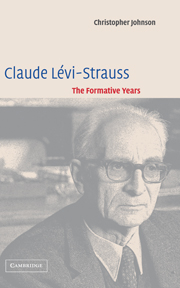Book contents
5 - Anthropology and autobiography
Published online by Cambridge University Press: 05 June 2012
Summary
Comme les mathématiques ou la musique, l'ethnographie est une des rares vocations authentiques. On peut la découvrir en soi, même sans qu'on vous l'ait enseignée.
(Like mathematics or music, anthropology is one of the few genuine vocations. One can discover it in oneself, even though one may have been taught nothing about it.)Tous les matins, je me rendais à la New York Public Library. Ce que je sais d'ethnologie, c'est pendant ces années-là que je l'ai appris.
(Every morning I went to the New York Public Library. What I know of anthropology I learned during those years.)The publication of Tristes tropiques in 1955 is a defining moment in Lévi-Strauss's career, and a significant moment in the intellectual history of postwar France. Quite apart from its impact in anthropology – a number of French ethnologists cite Tristes tropiques as the initial inspiration of their choice of vocation – it drew favourable critical responses from across the intellectual spectrum, from Sartre to Blanchot. The book has since become a classic, and is still in print almost fifty years after its publication, both in French and in its numerous translated versions. The book was not originally Lévi-Strauss's idea. The initial impulse came from Jean Malaurie, the veteran explorer and ethnologist who had recently launched a series named Terre humaine, in which the first publication had been his own Les Derniers Rois de Thulé.
- Type
- Chapter
- Information
- Claude Lévi-StraussThe Formative Years, pp. 148 - 179Publisher: Cambridge University PressPrint publication year: 2003



